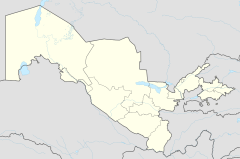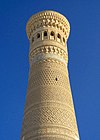| Abulkasym Madrassah | |
|---|---|
| Abulqosim madrasasi | |
 2007 Uzbek stamp showcasing the Abulkasym Madrassah 2007 Uzbek stamp showcasing the Abulkasym Madrassah | |
| Religion | |
| Affiliation | Islam |
| Location | |
| Municipality | Tashkent |
| Country | Uzbekistan |
 | |
| Geographic coordinates | 41°18′24″N 69°14′24″E / 41.3067°N 69.2399°E / 41.3067; 69.2399 |
| Architecture | |
| Style | Renaissance |
| Creator | Abul Kasim |
The Abulkasym Madrassah is an architectural monument located in Tashkent, Tashkent Province, Uzbekistan. It consists of a madrasa, a mosque and a khanaqah. The building was the location of the signing of a peace treaty in 1865 following the Russian capture of Tashkent.
Overview
The Renaissance architecture-styled structure was built in sections starting in 1920. As per customs at the time, madrassahs were named after the person who led the construction of the building. History has it that Abul Kasim, a noted personality in Tashkent, was behind the erection of the building.
What made Abulkasym Madrassah, formerly the center against the Russian invasion, historically important, was the signing of a peace treaty that took place at the building. Tashkent was captured shortly after by Russian General Chernyaev.
Following the October Revolution in 1919, the building was shut down. Later, the premises were used by a Tashkent toy factory. Over time, the building fell into disrepair. It was renovated only in the early 1980s, and inaugurated in 1987. The reinstated historical monument's cells were occupied by workshops that specialised in crafting traditional souvenirs catering to the tourist industry.
See also
- Mikhail Chernyayev
- Ulugh Beg Madrasa, Samarkand
- Shahrisabz Museum of History and Material Culture
- 2005 Andijan unrest
- Gur-e-Amir
- Bibi-Khanym Mosque
- Registan
- Amir Timur Museum
References
- "Madrassah of Abulkosim-sheikh". tashkenthotels.ru. Retrieved 25 May 2020.
- ^ "Abulkasym Madrassah". Visit Uzbekistan Travel. Retrieved 4 July 2013.
